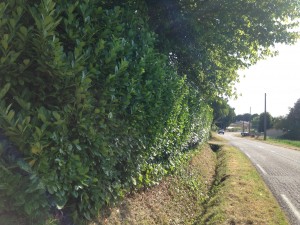August 2013
Dear friends,
I had the great fortune of spending a few days at Thich Nhat Hanh’s monastery in France this summer.

Because the Buddhist nuns living there have always been very generous with me, and I know that every extra guest means more work for them, I wanted to do something to support them in return. On my first day, I asked if there was any small job that they might want me to work on during the three days I would be visiting.
After several tries, the nun who manages the grounds said she had something for me. I let her know that I am not a gardener (I hire someone to weed my yard) but that I can learn to do anything. We walked down the country road in front of the monastery until we reached an ancient farmhouse that had recently been acquired for extra sleeping quarters.
Running next to the ditch alongside the road was a hedge, at least 10 feet high and 3-4 feet thick. It ran the length of the property, which I am guessing was about 30 yards. The sister pointed to the hedge and said that she wanted this hedge trimmed. I could not imagine how I would even begin to tackle this. I would need a ladder that could somehow reach from the ditch to the top of the hedge. I would also need clippers and about a month.
We walked around the hedge and I could see that it was more easily accessible from the other side. I estimated that it would take a team of landscapers with ladders at least a week to finish this job. I told the landscaping nun that I would probably not get very far, but I would do my best.
The nun offered me the best clippers available, but no ladder. The clippers had one dull metal edge that chopped against a plastic edge. In order to clip anything, I had to climb up into the hedge, slam the edges of the clipper together and twist with all my strength. Even using all my strength, I often had to pull and rip the edge of the bark to make the separation. Real gardeners everywhere are probably cringing, but what else could I do?
After the first two hours of intense, chaotic and very sweaty work, I had created a 3-foot high pile of clippings, and taken about one foot off of a very small section of hedge. I heard an inner voice telling me that I had to make more progress. I wanted to be “the one who trimmed the whole hedge in two days.” But at this pace, unless I worked through the night, it wasn’t likely.
There was nothing I could do to speed up the process– no better clippers, no one to help me. I was not going to be able to complete this job. I had to either let go and just keep clipping or give up now and go take a nap.
As I surveyed the newly trimmed area, I remembered a story that Thich Nhat Hanh told about hiking up a tall mountain in China. He and a group of monks and nuns were led by a tour guide up a steep mountain. Every ten steps, Thich Nhat Hanh would invite everyone to sit down, rest, and breathe. After the break they would stand up and continue another ten steps up the mountain. This pace continued all the way up the mountain. When they returned to the bottom of the mountain, Thich Nhat Hanh overheard their tour guide telling another guide that this was the most pleasant hike she had ever led, and for the first time she had reached the top feeling rested.
I decided to trim the hedge with this same attitude of relaxed work, regardless of how far I got. Changing my attitude changed everything. The work became much more pleasant. Knowing I could pause and rest anytime allowed me to work more systematically and less frantically. I began to feel a pattern in the trimming work, and it became smooth and relaxed.
Two and a half hours later, I had cut 2/3 of the way through the entire length of hedge. All that remained was the densest and tallest part of the hedge, which would require me to climb completely into the bushes. With my new attitude of ease, I decided to stop and rest for the remainder of the day. I could finish the next morning.
I had been certain that I would not be able to complete the job. But once I settled into working with no agenda and no pressure to finish, I had completed more than half of the work. As my goal to finish the job became a possibility again, so did the vision of me as the hero-who-finished-the-enormous-hedge in-two-days. That part of me was back and it really wanted acknowledgement for my contribution. I daydreamed about the praise I would get when I finished the job the next day.
It stormed all that night, and it was still pouring rain when I woke up. My plans for finishing the hedge were dashed. I realized I had gotten caught in my desire for recognition again. And again, I had to let it go and accept that I wouldn’t be able to finish.
By noticing my thoughts, I could sense the part of me that really wanted to contribute to the nuns, and the part that wanted recognition. Neither part was good or bad. But the part that wanted recognition created anxiety and stress in me, whereas the part that wanted to contribute trusted that whatever I did would be a contribution. It only wanted to help, so it didn’t need anything in return.
In the end, it stopped raining long enough for me to finish the hedge. The part of me that wanted recognition took before and after photos and complained to everyone about my cuts and bruises. That part is never completely satisfied. The part of me that wanted to contribute feels complete. Both parts are there, and that’s ok. But if I get caught in the desire for recognition, I don’t get the satisfaction that comes from knowing that I contributed, whether or not I completed what I set out to do.
Hiking slowly and mindfully up the mountain is wonderful, even if we never make it up the mountain. When we get hooked by thinking that we have to prove ourselves in order to contribute, we miss the wonderful feeling of satisfaction we can get in each moment of offering something, however small.
PRAISE AND BLAME, GAIN AND LOSS, PLEASURE AND SORROW COME AND GO LIKE THE WIND. TO BE HAPPY, REST LIKE A GIANT TREE IN THE MIDST OF THEM ALL. –THE BUDDHA
The Buddha taught that praise and blame are just two sides of the same coin. When we look for praise, we will always find both praise and blame. We never can get just praise. But when we turn our attention toward our desire to contribute, there is always happiness waiting for us there.
with love,
annie.
